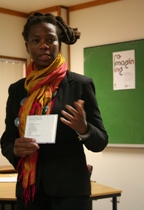
Liberation songs, which are a part of “intangible heritage”, are emotionally evocative and carry highly individualised meanings for people, said van Damme. Comparing the recent incident in which Julius Malema was indicted for singing “dubula ibhunu” (shoot the boer), to Miriam Makeba’s singing of struggle songs, van Damme dispassionately asked the audience to consider the difference between the two: “Why should one song be considered hate speech while we still have other songs?”
highly individualised meanings for people, said van Damme. Comparing the recent incident in which Julius Malema was indicted for singing “dubula ibhunu” (shoot the boer), to Miriam Makeba’s singing of struggle songs, van Damme dispassionately asked the audience to consider the difference between the two: “Why should one song be considered hate speech while we still have other songs?”
Some recognised that the songs were a powerful reminder of history. One audience member said, “For me, at a personal level, they were very, very inspiring.” Others believed that context and intention dictate appropriateness when it comes to the modern singing of these songs. A different message was conveyed when a liberation song was used for political versus artistic/entertainment purposes, for example.
when a liberation song was used for political versus artistic/entertainment purposes, for example.
Van Damme also discussed the delicate issue of erasure. By banning liberation songs, are we losing a significant part of our history? Are we censoring cultural expressions and practices – things which provide people with a sense of belonging and continuity ? “The project of heritage is to make history more present,” said van Damme explaining SAHRA’s preoccupation with songs like “dubula ibhunu”. Ultimately, we needed to decide for ourselves which traditions we will keep and which ones we will shed; it is, however, important that we do this consciously, bearing in mind the implications of both.
? “The project of heritage is to make history more present,” said van Damme explaining SAHRA’s preoccupation with songs like “dubula ibhunu”. Ultimately, we needed to decide for ourselves which traditions we will keep and which ones we will shed; it is, however, important that we do this consciously, bearing in mind the implications of both.
